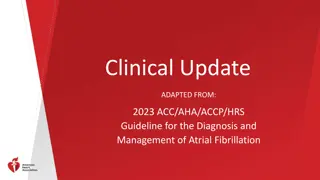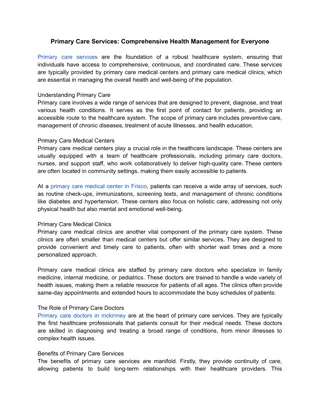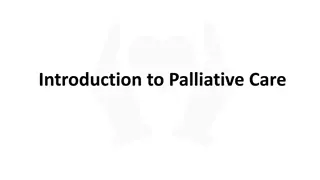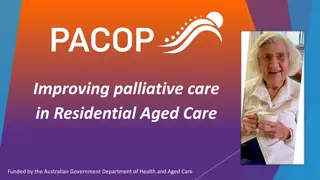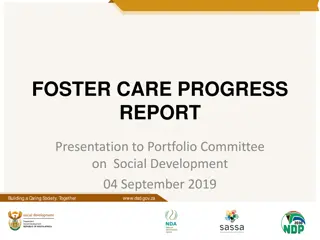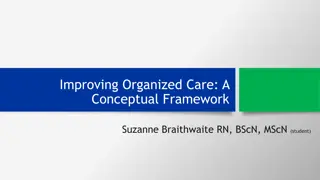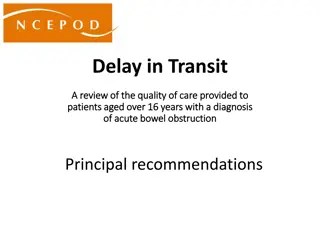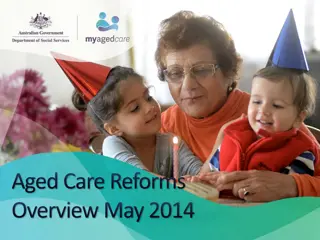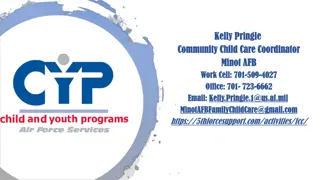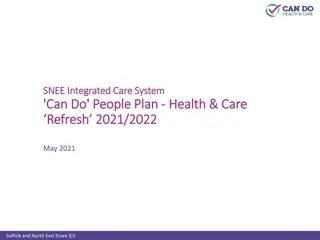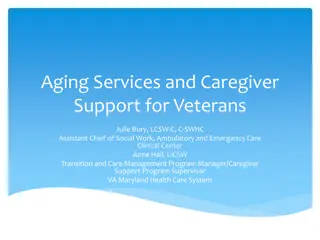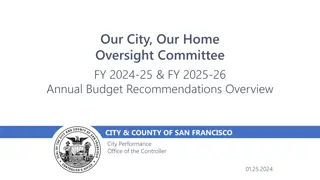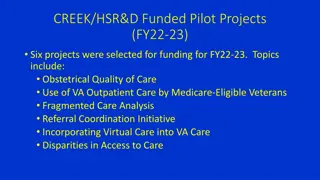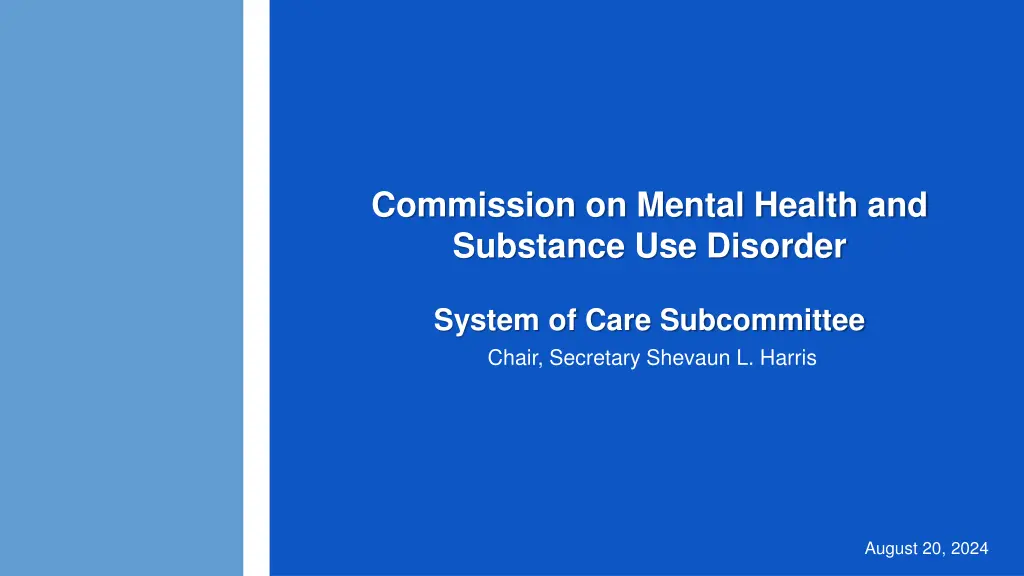
Enhancing Mental Health and Substance Use Disorder Services in Florida 2024
Explore the initiatives of the 2024 System of Care Subcommittee chaired by Secretary Shevaun L. Harris to improve mental health and substance use systems in Florida. Priority areas include unique needs, deep end services, and skills-based training. Key strategies involve implementing the Critical Time Intervention model, expanding Assertive Community Treatment teams, and increasing short-term residential treatment capacity.
Download Presentation

Please find below an Image/Link to download the presentation.
The content on the website is provided AS IS for your information and personal use only. It may not be sold, licensed, or shared on other websites without obtaining consent from the author. If you encounter any issues during the download, it is possible that the publisher has removed the file from their server.
You are allowed to download the files provided on this website for personal or commercial use, subject to the condition that they are used lawfully. All files are the property of their respective owners.
The content on the website is provided AS IS for your information and personal use only. It may not be sold, licensed, or shared on other websites without obtaining consent from the author.
E N D
Presentation Transcript
Commission on Mental Health and Substance Use Disorder System of Care Subcommittee Chair, Secretary Shevaun L. Harris August 20, 2024
2024 SYSTEM OF CARE SUBCOMMITTEE Review and evaluate the management and functionality of the existing publicly supported mental health and substance use systems and services in the Department of Children and Families, Agency for Health Care Administration, and other departments which administer mental health and substance use disorder services. 2
2024 SUBCOMMITTEE PRIORITY AREAS Individuals with Unique Needs Deep End Services Skills-based Training 3
1 Develop new care coordination teams that use the Critical Time Intervention (CTI) model for individuals who meet the high utilization threshold. Background: The Critical Time Intervention model (CTI) is an evidence-based intervention that is effective in reducing psychiatric readmission and homelessness in patients with serious mental illness. CTI is longer (typically nine months) than traditional Care Coordination. Prospective Impact: The CTI model would support early interventions to decrease admissions to State Mental Health Treatment Facilities. Key Partners: Department of Children and Families, Agency for Health Care Administration, community behavioral health providers. 4
2 Increase the number of Florida Assertive Community Treatment teams and Forensic Multi-disciplinary Teams statewide. Background: Florida Assertive Community Treatment teams and Forensic Multi- disciplinary Teams utilize the evidenced based Assertive Community Treatment model to provide comprehensive community-based treatment to individuals with serious mental illness. Prospective Impact: Expansion of FACT would allow diversions of individuals from going to State Treatment Facilities and provide a step down from State Mental Health Treatment Facilities. Key Partners: Department of Children and Families, Agency for Health Care Administration, community behavioral health providers. 5
3 Increase Short-term Residential Treatment facility capacity for adults and children. Background: Short-term Residential Treatment facilities provide a 24/7 secure and therapeutic setting, that provides continued stabilization for an individual experiencing a mental health crisis. Prospective Impact: SRT facilities provide longer stabilization to prevent subsequent readmissions. Key Partners: Department of Children and Families, Agency for Health Care Administration, community behavioral health providers. 6
4 Increase use of Long Acting Injectables prior to discharge from State Mental Health Treatment Facilities. Background: Research suggests that a Long Acting Injectables may be considered at inpatient discharge when future adherence is uncertain. Prospective Impact: Patientson a Long Acting Injectables are more likely to transition to their aftercare. Key Partners: Department of Children and Families, Agency for Health Care Administration, insurance companies. 7
5 Increase capacity for residential treatment facilities. Background: The average length of stay in a residential treatment facility is typically longer than a State Mental Health Treatment Facility, but the cost approximately 90% less per year. Prospective Impact:Individuals are provided hands-on life skills training and case management services while also receiving continued monitoring of their mental illness. Key Partners: Department of Children and Families, Agency for Health Care Administration, providers. 8
6 Increase crisis response teams focused on seniors to divert older adults from deeper end services (e.g., emergency rooms, crisis stabilization units, etc.) and provide follow-up to ensure continued stabilization. Background: Older adults account for approximately 7% of involuntary examinations each year. A senior-focused Marion County Pilot shows promising diversion rates from Crisis Stabilization Units (95.4%) and emergency departments (96.68%). Prospective Impact: Diversion of older adults from arrests, emergency departments, and Baker Act receiving facilities, while stabilizing and coordinating follow-up supports. Key Partners: Department of Children and Families, Department of Elder Affairs, Agency for Health Care Administration, insurance companies, community providers. 9
7 Increase emergency and respite housing options that will provide enough time for evaluation of longer term more appropriate services, including permanent housing options. Background: Unsafe housing conditions prompt the Agency for Persons with Disabilities to immediately remove individuals and place them in emergency housing while determining alternate placement opportunities. Prospective Impact: Promote client safety, prioritize Medicaid waiver waitlist, and blend funding. Key Partners: Agency for Persons with Disabilities, Department of Elder Affairs, Senior Crisis Response teams, Department of Children and Families, Managing Entities, Public Guardians, Agency for Health Care Administration, Housing Authority, law enforcement agencies. 10
8 Develop a comprehensive directory of statewide behavioral health training resources. Background: Florida is currently without a roadmap of available behavioral health training resources for professionals and non-professionals. Prospective Impact: The directory would support organizations seeking to help individuals, families, and communities develop skills to identify and help someone who is experiencing behavioral health challenges. Key Partners: Department of Children and Families, Agency for Health Care Administration, Managing Entities, community behavioral health providers, hospital and health care system partners, Florida Chamber and other business partners. 11
9 Develop a plan to disseminate the statewide behavioral health training resources directory. Prospective Impact: Communities and organizations will have awareness and access to training resources. Key Partners: Department of Children and Families, Agency for Health Care Administration, Managing Entities, community behavioral health providers, hospital and health care system partners, Florida Chamber and other business partners. 12
10 Conduct an annual review to update the directory with new resources. Prospective Impact: Communities and organizations will have access to training resources that are updated with new evidence-based resources, best practices, and research findings. Key Partners: Department of Children and Families, Agency for Health Care Administration, Managing Entities, community behavioral health providers, hospital and health care system partners, Florida Chamber and other business partners. 13



